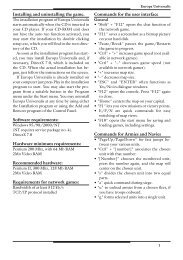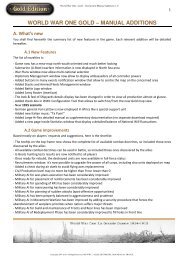You also want an ePaper? Increase the reach of your titles
YUMPU automatically turns print PDFs into web optimized ePapers that Google loves.
Promises<br />
Starting with 1915, during the Interphase, both sides may make<br />
“promises”, via Political Actions, to Italy and to Romania if they are not yet<br />
at war, in order to get diplomatic bonuses.<br />
The Entente may similarly take a Political Action to recognize the “rights” of<br />
Bulgaria in the Balkans, in order for them to become no longer pro-Centrals<br />
(but there are penalties applied for the Entente on its neighbors).<br />
Some promises have indirect consequences on the Peace or on the<br />
country stability (NW loss, influence on the Parliament, etc), especially for<br />
Austria-Hungary.<br />
17.5 Nations Status and Levels<br />
Each major power or minor nation still at peace has an “alignment”<br />
respective to each side (pro-Centrals, pro-Entente, Neutral or Isolationist).<br />
This alignment of a country may change according to its Diplomatic Level.<br />
Diplomatic Levels<br />
The relations between neutral nations and the two opposing alliances are<br />
evaluated through a system of diplomatic thresholds, or Levels. Each level<br />
brings specific advantages and benefits if favourable to a certain alliance<br />
(on the other hand, the opposite side is, at best, unaffected, and more<br />
likely penalized by the level’s effects).<br />
This level affects directly your diplomatic negotiations. As the result of the<br />
same diplomatic action, it is likely that more than one level is crossed<br />
and/or reached at the same time.<br />
The following levels are in play:<br />
Agricultural Aid: you receive some Economic Points (EP) each Planning<br />
phase and are less affected by the effect of blockade (particularly<br />
interesting for the Central Powers).<br />
Economic Aid: you receive some Economic Points (EP) each Planning<br />
phase.<br />
Military Aid: you receive some Economic Points (EP) and some Munitions<br />
(MUN) each Planning phase.<br />
Passage Rights: the neutral nation allows passage through its territory (by<br />
rail or normal move), but you cannot stay there. Supply is allowed to flow<br />
across the neutral borders and territory.<br />
Limited Intervention: the neutral nation sends you a force to assist<br />
in the war, usually under the form of one of his armies (or corps), maybe<br />
even some warships, its entry in the war is only a matter of time now.<br />
Entry in War: the neutral nation joins your alliance and declares war on the<br />
opposite side.<br />
NB: the “Swiss” symbol indicates the nation is currently neutral (not<br />
belongs to Switzerland)<br />
17.6 War Declarations<br />
A nation must declare war on another in order to attack it. This can be done<br />
directly via the Diplomatic Window. If you wish to see a nation join your<br />
side, then you must send a diplomatic mission to it (see above).<br />
Entry Into War After August 1914<br />
A major Power may declare war on a country still in at peace. No “surprise<br />
attack” is allowed (you still have to use good manners). The target of the<br />
declaration of war joins the other side, and it immediately starts its<br />
mobilization.<br />
Declaration of War on a Neutral Country<br />
Please note that if a Power declares war voluntarily on a neutral country<br />
(click on the “Declare War” button), this negates the usual chain<br />
“diplomatic” reactions of the other neutral countries (that normally happen<br />
when a minor enters the war by it own will and declaration as a<br />
consequence of diplomatic action and presence of Ambassadors),<br />
because this declaration of war is involuntary.<br />
17.7 Peace<br />
When a nation is militarily and fully occupied (all cities captured), an<br />
unconditional peace is automatically signed and the nation surrenders.<br />
Some nations may surrender as soon as their capital city is captured<br />
(automatically or with a test). But some other nations, such as Belgium,<br />
Switzerland, Serbia or even Rumania never surrender as long as they<br />
retain some fighting forces on the map.<br />
You may also select one of your nations and sue for peace (i.e. surrender).<br />
In that case, you’re most likely to lose the game.<br />
17.8 Separate Peace<br />
Separate Peace may be attempted by the use of special political actions.<br />
It is possible only for Russia on the side of Entente and Austria-Hungary<br />
on the side of the Central Powers. These powers may enter secret<br />
peace talks with the enemy alliance, via the use of specific political<br />
actions.<br />
World War One: La Grande Guerre 1914-1918 91
















